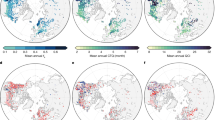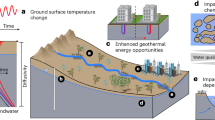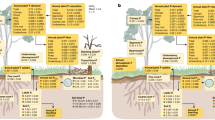Abstract
IN a paper published in 1949, Dixon and Barlee1 provided evidence of activated absorption of water by cut shoots, the leaves of which are in a saturated atmosphere or submerged in water, which does not appear to be open to the objections raised by Smith, Dustman and Shull2 to Dixon's earlier experiments3. The fact that an atmosphere of nitrogen brings such absorption to an end, in some cases reversibly, shows that neither a residual water deficit nor transpiration from the leaves attributable to small temperature differences (due to absorption of light by the leaves) can account for the absorption observed when oxygen is available. It is nevertheless difficult to conceive a mechanism whereby transpiration into a saturated atmosphere could be maintained.
This is a preview of subscription content, access via your institution
Access options
Subscribe to this journal
Receive 51 print issues and online access
$199.00 per year
only $3.90 per issue
Buy this article
- Purchase on Springer Link
- Instant access to full article PDF
Prices may be subject to local taxes which are calculated during checkout
Similar content being viewed by others
References
Sci. Proc. Roy. Dublin Soc., 22, No. 20 (1940).
Bot. Gaz., 91, 395 (1931).
Notes from the Bot. School, Trin. Coll., Dublin, 1, 106 (1898); 4, 319 (1938).
Discussions of the Faraday Soc., No. 3, 159 (1948).
Author information
Authors and Affiliations
Rights and permissions
About this article
Cite this article
THODAY, D. Transpiration into a Saturated Atmosphere. Nature 164, 541–542 (1949). https://doi.org/10.1038/164541c0
Issue Date:
DOI: https://doi.org/10.1038/164541c0
This article is cited by
-
Cause of the Absorption of Water by Submerged Shoots
Nature (1950)
Comments
By submitting a comment you agree to abide by our Terms and Community Guidelines. If you find something abusive or that does not comply with our terms or guidelines please flag it as inappropriate.



